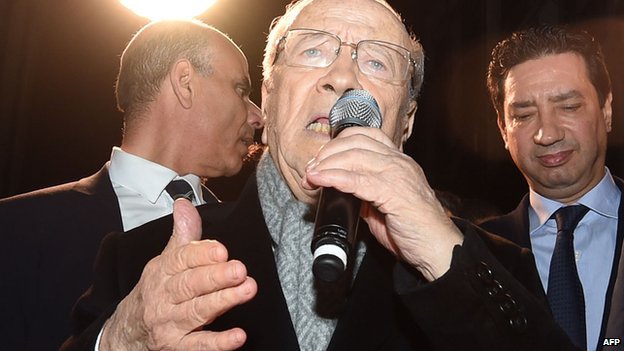 Beji Caid Essebsi has urged all Tunisians to “work together” for stability
Beji Caid Essebsi has urged all Tunisians to “work together” for stabilityHe secured 55.68% of the vote in Sunday’s run-off, defeating caretaker president Moncef Marzouki (44.32%), the head of the electoral commission said.
Mr Marzouki, a 67-year-old former exile, earlier refused to admit defeat.
Mr Essebsi, 88, has urged all Tunisians to “work together” for stability but critics say his win marks the return of a discredited establishment.
They point out that he served under President Zine el-Abedine Ben Ali, who was ousted in 2011 after the Arab Spring revolution triggered uprisings across the region.
Mr Essebsi was also in the cabinet of Tunisia’s first post-independence leader, Habib Bourguiba.
Earlier on Monday, police fired tear gas in the southern city of Hamma to disperse hundreds of demonstrators who burned tyres in protest at Mr Essebsi’s victory.
The results of the run-off vote were announced by the head of the electoral commission, Chafik Sarsar, who was visibly emotional.
It is the first time Tunisians have been able to vote freely for their president since independence from France in 1956.
 Mr Essebsi’s supporters began celebrating after the polls closed on Sunday
Mr Essebsi’s supporters began celebrating after the polls closed on SundayMr Marzouki earlier criticised Mr Essebsi for declaring victory based on exit polls.
“The announcement of victory is undemocratic and we should wait if we want to be a state that respects the rule of law,” he told supporters.
Mr Marzouki has been interim president since 2011 and is more popular in the conservative, poorer south.Tunisia presidential elections
55.6%
voted for Beji Caid Essebsi
44.3%
voted for Moncef Marzouki
- Votes cast: 3,110,048
- Turnout: 60%
He was thought likely to attract support from the moderate Islamist Ennahda party, which has played a key role in Tunisian politics since the Arab Spring but did not field a candidate.
‘Martyrs of Tunisia’On Sunday, Mr Essebsi appeared on television after polls closed: “I dedicate my victory to the martyrs of Tunisia.”
“I thank Marzouki, and now we should work together without excluding anyone,” he added.
Supporters danced and let off fireworks outside the headquarters of Mr Essebsi’s secular-leaning Nidaa Tounes party.
Beji Caid Essebsi
- 88-year-old lawyer and politician
- Studied law in Paris
- Interior minister under Habib Bourguiba, Tunisia’s first president after independence
- Speaker of parliament under ousted President Zine el-Abedine Ben Ali
- Interim prime minister in 2011 after the uprising
- Founder of secular-leaning Nidaa Tounes party in 2014
- Supported by Tunisian General Labour Union and some business groups
Mr Essebsi led in the first round of voting last month with 39% of the vote. Mr Marzouki polled 33%.
He is popular in the wealthy, coastal regions, and based his appeal to voters on stability and experience.
The new president will have restricted powers under a constitution passed earlier this year.
He will be commander-in-chief of the armed forces but can appoint or sack senior officers only in consultation with the prime minister.
The president will also set foreign policy in consultation with the prime minister, represent the state and ratify treaties.
Tunisia boosted security for the elections and closed border posts with Libya, which has been plagued by unrest.
FRENCH VERSION
M. Marzouki, un exil ancien de 67 ans, auparavant refuséd’admettre la défaite.
Monsieur Essebsi, 88, a exhorté tous les Tunisiens à « travaillerensemble » pour la stabilité, mais les critiques disent que savictoire marque le retour d’un établissement discrédité.
Ils font remarquer qu’il a servi sous le Président Zine el-AbedineBen Ali, qui avait été évincé en 2011 après la révolution duprintemps arabe a déclenché des soulèvements dans toute larégion.
Monsieur Essebsi était également dans le cabinet du premier chefd’après l’indépendance de la Tunisie, Habib Bourguiba.
Plus tôt le lundi, la police a tiré des gaz lacrymogènes dans la villeméridionale de Hamma, pour disperser des centaines demanifestants qui ont brûlé des pneus pour protester contre lavictoire de M. Essebsi.
Les résultats du vote de ruissellement ont été annoncés par lechef de la commission électorale, Chafik Sarsar, qui est visiblementému.
C’est la que première fois tunisiens ont pu voter librement pourleur président depuis l’indépendance de la France en 1956.
« L’annonce de la victoire est antidémocratique et nous devrionsattendre si nous voulons être un Etat qui consacre la primauté dudroit, » il dit des partisans.
M. Marzouki a été Président par intérim depuis 2011 et est pluspopulaire dans le sud conservateur et plus pauvre.Électionsprésidentielles Tunisie


